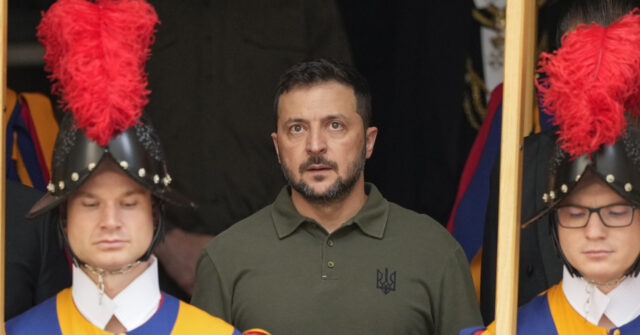Pope Francis recently met with Ukrainian President Volodymyr Zelenskyy at the Vatican, adding to Zelenskyy’s European tour aimed at garnering support for his “victory plan” designed to conclude the ongoing war with Russia. The private audience lasted 35 minutes and took place in the historic Sala della Biblioteca. During their meeting, Pope Francis presented Zelenskyy with a bronze plaque symbolizing peace, depicted as a delicate flower, encapsulated by the inscription, “Peace is a fragile flower.” Zelenskyy reciprocated by gifting the Pope an oil painting that memorializes the atrocities committed in Bucha, a location ravaged by violence during the early stages of Russia’s full-scale invasion of Ukraine in February 2022.
Following their personal discussions, Zelenskyy met with key Vatican officials, including Secretary of State Pietro Parolin and Archbishop Paul Richard Gallagher. The Vatican released a statement outlining the focus of their discussions, emphasizing the current state of the war, the dire humanitarian circumstances in Ukraine, and potential pathways toward achieving a just and sustainable peace. The talks also touched on matters relating to the religious climate in Ukraine, illustrating the multifaceted nature of conversations concerning the conflict. Since the invasion began, there has been ongoing dialogue between Pope Francis and Zelenskyy, who have communicated through numerous channels, including letters and phone calls.
However, Pope Francis’s vocal advocacy for peace has not been without controversy. Earlier this year, he faced criticism from Ukrainian officials when he suggested that they should consider the “white flag” of surrender as a means of negotiating an end to hostilities. His repeated calls for a cessation of fighting have underscored the need for diplomatic solutions, alongside an emphasis on humanitarian issues such as prisoner exchanges. In line with this diplomatic mission, Cardinal Matteo Maria Zuppi was appointed a special envoy tasked with mediating tensions between the warring parties and advocating for the exchange of prisoners, as well as addressing the plight of Ukrainian children taken to Russia.
As Zelenskyy continues his European trip, he aims to solidify international support for a plan that he states is intended to foster conditions conducive to a fair conclusion of the war. Despite not having fully articulated the specific components of his “victory” proposals, his recent discussions with European leaders, including meetings with British Prime Minister Keir Starmer, French President Emmanuel Macron, and Italian Premier Giorgia Meloni, reflect a strategic approach. His travels are likely influenced by the political landscape in the United States, particularly with the imminent U.S. elections and the past criticism of American support for Ukraine by figures like former President Donald Trump.
The current military situation remains precarious for Ukraine, particularly in the eastern Donetsk region, where intense pressure from Russian forces has resulted in territorial losses. Reports indicate that Ukraine’s army has been pushed out of key locations, including the town of Vuhledar, with Russian troops now controlling a significant portion of nearby Toretsk. As fighting escalates, Zelenskyy is in dire need of assistance to bolster his forces. His diplomatic engagement across Europe underscores the urgency of securing additional military and humanitarian support to counteract the ongoing challenges faced by Ukraine in this protracted conflict.
In summary, the meeting between Pope Francis and President Zelenskyy marks a significant moment in the continuing effort to address the war in Ukraine and its implications for global peace. Their discussions not only highlight the humanitarian crisis resulting from the conflict but also reaffirm the importance of international diplomacy in seeking resolutions to such complex geopolitical issues. As Zelenskyy’s European tour unfolds, the international community remains watchful of the developments, knowing that the outcomes could have lasting repercussions for both Ukraine and the stability of Europe as a whole.

